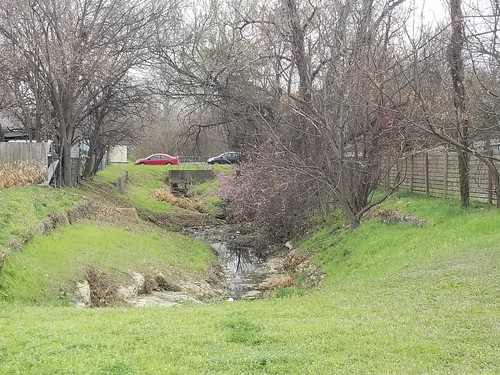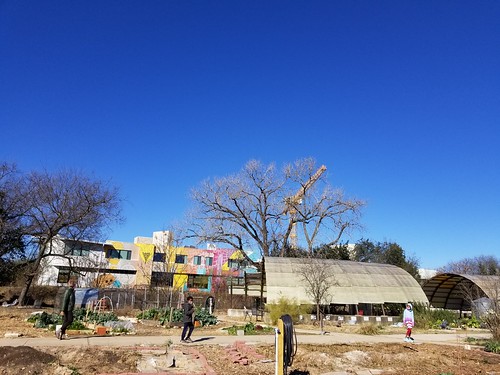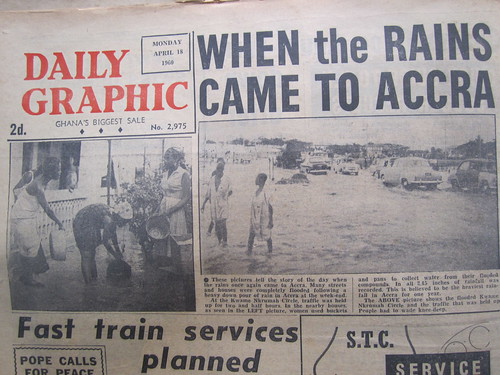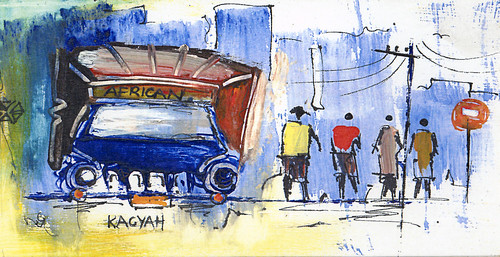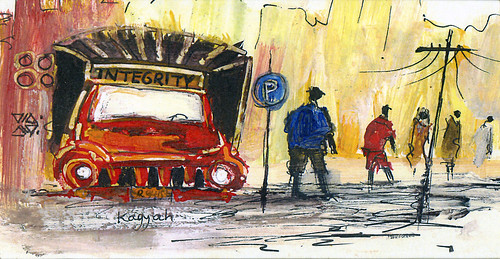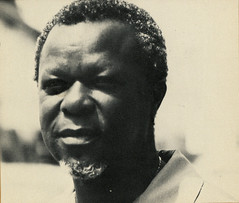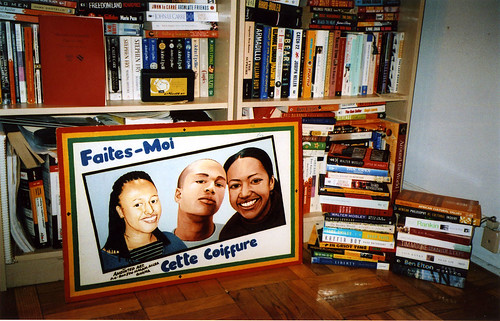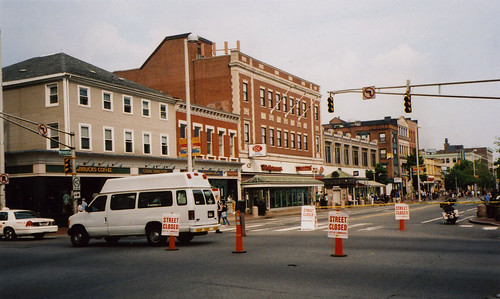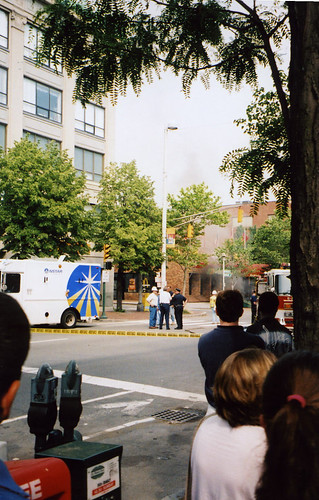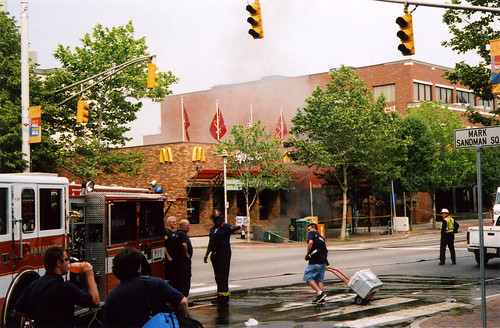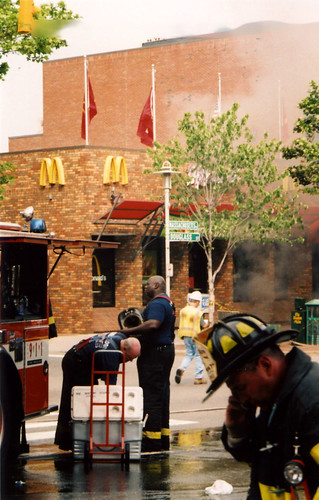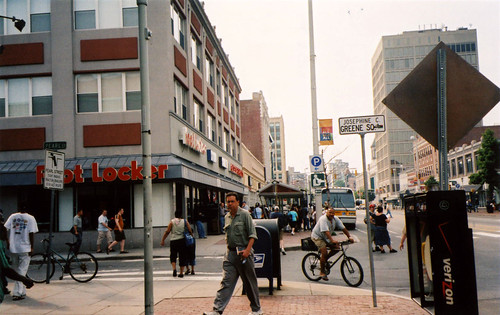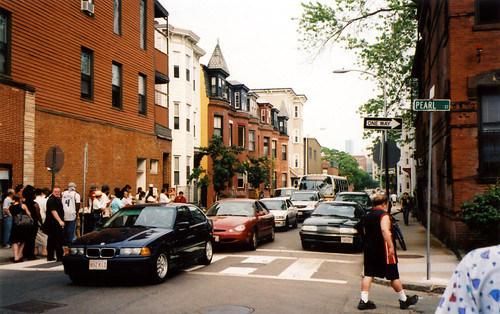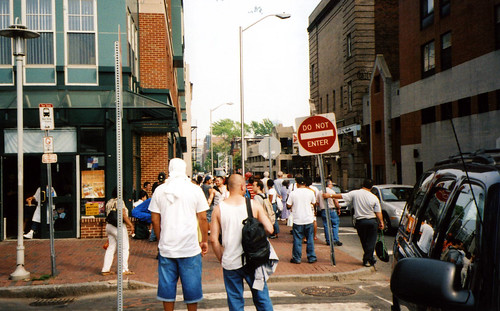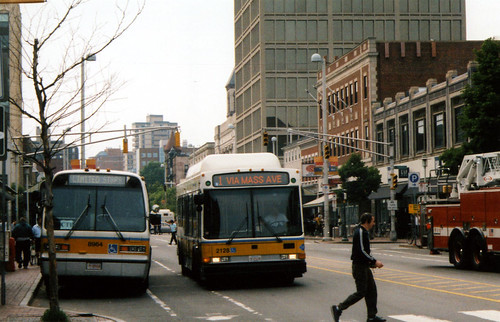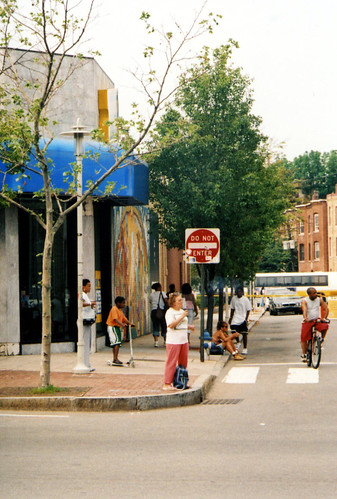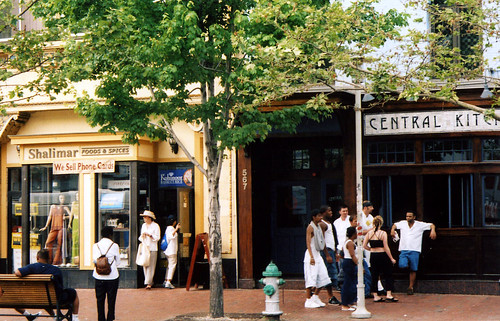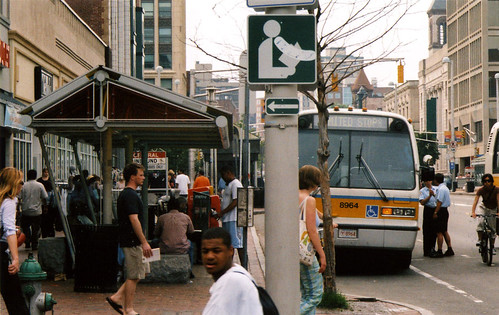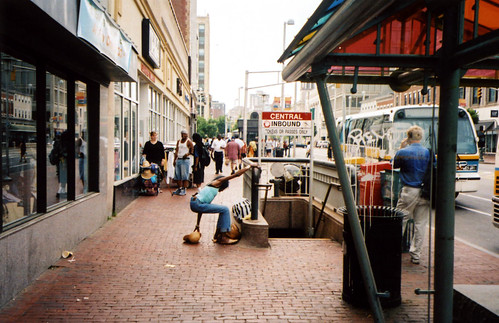The only open issue in your mind was whether the house had been a brothel or a boarding house. As you walked out and weighed the ambiguous evidence, you decided on the latter. Either way, what you had seen, what you had smelt, in those ten minutes was misery itself. Human misery. It was a house of forced labour, of lost dreams. To call it an open house was to do violence to the very term; it was the reverse, a closed house in every imaginable way, featuring those elements of coercion, those elements of powerlessness and, especially, those elements of cruelty whose vestiges still lingered inside. It was the kind of cruelty that only men do to others.
But they called it an open house, that's what the sign outside proclaimed. The Wife and you had no clue, you had simply been on your rounds, doing your Sunday house hunting and getting to know the town. It was your penultimate stop that July afternoon. "It sounds like a bargain, it just came on the market. Spacious too." Well now you knew. Real estate.
It was a quiet walk out of the house and you periodically looked at each other, as if to confirm what you both had seen. "I feel like I'm going to cry", she said finally. You simply fumbled around for the Zipcar card to open up the rental. "Me too", you muttered as you waved your piece of plastic in the air above the windshield. The click unlocked the Prius. "I feel sick". Hell you needed a cold shower or a stiff drink.
It was a hot day and there was a stir in the neighbourhood, you hadn't quite noticed it when you had entered the house earlier on. People were beginning to come onto their porches, pointing and peeping at the house. A few had stepped out and were now making their way towards the house for their viewing. Presumably there had been much talk about whatever had been going on in its confines, thus all the neighbours were expectant and interested. They had long suspected that bad things were happening there, this was their opportunity to bear witness. Reflecting on it, you had been a little disturbed at the way some of those children were running amok inside that house. Your own walkthrough had been very sober.
There had been a pungent odour to the place, it smelled of... Well... The smell lingered even as you considered the case. You turned around and looked at the house again. That smell... Yes, it was the smell of unhappiness, of people who slept in shifts... This wasn't student housing, nor indeed was this your garden variety slum housing. There was no pleasure here, this kind of forced labour has the kind of disagreable odour you tried to forget but couldn't.
As if to confirm things, you notice that woman who had grabbed her two children just a few moments earlier, also leaving the house in a hurry. She was silent and grim-faced, dressed in her Sunday best, a school teacher type. Her eyes were disturbed beacons. She knew what she had seen. She knew what this was - a bad house, and she needed to get her progeny out of there before they too became tainted by it. She held on tight to them as she passed you. It was the first viewing, it was an open house. You were all victims.
As you sat in the car the two of you began to compare notes. It's funny how it all came out in a hurry now as opposed to the steady accretion of details when you'd been walking through the house.
"It was young women, coerced into doing who knows what"
A musty smell of resignation.
"Not many laughs in the house."
"It couldn't be a brothel, right?"
Does despair have a smell?
"They must have left in a hurry."
"No. not men. Doesn't smell like men." It was the smell of cheap perfume and women's hair.
"Pommade."
I'd seen many boarding houses of immigrants - men and women. This was disconcerting.
"No, it can't be a brothel. It would be more upscale. I don't think they'd bring clients here. Well..."
"So. A prostitution ring?"
"Yeah... This is where they kept the women until they sent them out to work."
"But what about the basement? Don't you think?..."
"No. Who would come to this place?"
The basement was the tipping point, its aura of unease had unnerved you.
"Here, let me see the flyer again"
"Wonderful Enormous 7 Room Finished basement" was what the flyer had advertised.
"People had left in a hurry... Very recently..."
"There were ..."
Your guess: 10-30 "guests" were accomodated in the house, most likely.
"Prostitution ring. It must be. Young women."
"Young women."
"They didn't have much to do with the neighbours."
"The rooms, the layout... Labyrinth..."
What troubled you most was the absence. Where were the inhabitants? Where were the most recent residents? Were they still in service somewhere, or had the entire operation been shut down? The cots or bunk beds weren't there.
"Cleaned out."
"I'm creeped out."
"Where are they now? I wonder..."
Too many questions and you didn't dare get them all answered for fear of further depression. These places surely exist, houses of prostitution, houses of trafficking even - but do you really want to know?
It wasn't about drugs: this wasn't a crack house or even a crystal meth house like you might have read about in Oakland, or hypothesized must exist in South Berkeley. And it wasn't immigrant workers... It wasn't men who lived here, of that you were sure. You pondered the question, the puzzle of this open house.

Then it struck you that the owner had been there.
"The owner!", you both exclaimed simultaneously.
"The owner. That's right, the owner..."
You knew it as you'd walked past him but hadn't wanted to admit it to yourself. Black guy. He didn't look like the agent but looked to have authority, wearing what he did, and standing the way he did in the kitchen. The almost orange suit trousers and the shirt that looked a little dressy. The slightly sharp tan shoes. He was a pimp, a gentleman of leisure. The fruits of his leisure were on display for sale today.
It's funny how these details came back.
You had caught his lecherous assessment of The Wife. Well perhaps not lecherous, just a cool, calm assessment with a practiced eye. How could she be used?
She later said as you exchanged notes, "Yes, he was sizing me up. It was that kind of look. There was definitely a sexual angle there".
Was that how he picked up his women, runaways or those who arrived at the Greyhound station barely ten minutes away? The easy triage of the flesh, the evaluation of weakness, a prelude to the approach.
Still, don't underestimate the man, he's been doing this for a while and this house sale is a temporary setback.
People, his people, had recently left the house. It had just been cleared of much of the incriminating evidence, the sleeping cots, but you can't disguise the smell. The house couldn't but reveal its purpose. Sweet misery, the bitter pungent odour of desperation, the heavy vibes of predation.
It was as you had mounted into the attic earlier that the smell really hit you. What was worse as you inspected it, was the realization that someone had been living there, even in that attic. Could it have been a punishment room perhaps?
When you came down from the attic, shaken, and about to get her to leave, The Wife slowly pointed to a door. By that point you didn't know what to think. "I don't want to know what's behind the door". You grabbed her hand and made to leave on. Some things are not worth knowing.
As you passed you saw that the closet held a few desultory cans of paint - funny that. You can't cover over the layers of of iniquity, and they certainly hadn't bothered trying in the house - or maybe they had, yes. You looked around and saw one wall vaguely painted. Well half a room isn't bad. They hadn't even had time to throw on a gesture before the viewing. Barely painted, the rest of the house was left raw and unadorned. They'd just listed it. Talk about an open house.
This troubling puzzle you'd tried to decipher as you walked through this house on [redacted] street.
"I'm steering clear of South Berkeley and North Oakland."
"I'm not doing any more open houses" was your rejoinder.
You returned again to the scene in the kitchen just minutes earlier. There was a certain axis of malignancy in that triangle. The real estate agent, the potential buyer looking for her entree into the society of slum lords, looking to flip the property, and, last but not least, the owner. A ruthless predatory vibe emanating from all three of them.
"It's structurally sound, a steal at that price." The real estate agent had no conscience. She was just selling it. Condescending too, to the couple who had asked for a leaflet earlier - she had dismissed them as window shoppers, not her brand of client. The Wife had observed that this was the most predatory real estate broker in town that was arranging the showing.
"What's a probate record?", asked the buyer, the prospective slum lord.
"Now we're talking", she started her spiel. The owner chuckled.
There was lots of interest in the property per the web site and the open house had gotten quite crowded by the time you were getting ready to leave. Slum housing has lots of possibilities, you suppose.
But you couldn't have been the only ones who recognized the suffocating atmosphere. You thought back to the church ladies clutching their handbags; they had their eyes wide open. The harrowing sights and the smell.
"This housing bubble is out of control. Pimps are getting into the act. We've been here a year, look, this is ridiculous. We've seen what, maybe 150 houses, all these overpriced open houses, and now we've seen this... this... what's the phrase again.. this charnel house, this den of iniquity."
At that The Wife laughed.
You continued, "I'm sure that they used some of the rooms here to have their way with the women. I just don't know. Or did they just use it to keep them and made them work in streets. Where were the women from. Black or Mexican? What do you think?"
"What was that satellite dish for in that concrete backyard?"
"Oh yeah, I saw that"
"Was it transmitting or was it receiving? A bordello?"
"It isn't worth thinking about. Let's go." You started the car.
...
Fifteen minutes later on a lark to detox, you entered the million dollar home listed on the other side of town. You saw the manicured lawns, the granite countertops, the wholesome picket fences of North Berkeley, a world away.
What is this town you live in? Where do you live? How to get a measure of a place? To think just ten minutes away from this...? Do they know what is happening just down the road?
You will never buy a house on that street. You may not believe in evil but this is a dark matter. They were, he was, trafficking in human souls, if not humans flesh and labour itself. You've lost your innocence.
There are people behaving badly... They know, he knew... And you saw it in his eyes. A little embarrassed, perhaps, but it was a way of life, it was his way of life, and he chose it, he'd live with it. Heck, he was even looking to get a bit above land resale value out of the house. The hustle continued.
True, the affair had shut down in a hurry. That they had cleared out within living memory... made things all the more worrying... perhaps just days earlier. Where were the people? Where are the people he was using? Disposable people.
You couldn't bear to do the research. But at the back of your mind, you surely knew. There's a paper trail for sure, if you searched you could put the story together. Trust your intuition, you're the son of a journalist.
...
It had been an assisted living facility ten years ago.
After some more digging on your conjecture, you determined that this was originally a family business. They did things like funeral homes on the Oakland-Berkeley border. The young one, the current scion was obviously into more grisly stuff - he had a stable of women. Probably not picky could even be those Honduras or El Salvador women so beloved in West Oakland. People steered clear of the operation but it was open knowledge what went on there. You stopped digging.
The open house.
There was a sick feeling in your stomach, you have been in the presence of malignancy. And it has been like that for a long while.
The open house.
Where are the women? Where did they go?
The open house.
The stain persists whenever you walk through an open house.
The listing, July 2007
[Redacted] Street, Berkeley, CA
Price: $583,000
Huge Craftsman! Grand Dame In Need Of New Mate! 2594 Sf 5Bd/ 2Bath, Formal Dining Rm.,& Great Home Office; All On Main Floor. Gracious Front Porch & Wonderful Attic. Zoned R2a For Pos.Duplex Use. 1919 Vintage Detail! Wonderful Enormous 7 Room Finished Basmt. W/2 Sep. Pvt. Entry. Open Sun 2-5.
5 Bedrooms, 2 Baths, Main Entry Room - Additional: Basement Finished, Formal Dining Room, In-Law Quarters, Office, Rec/Rumpus Room, Unfinished Room, Utility Room
Postscript
This was the penultimate open house we viewed together in our time in Berkeley. I stuck to my resolve. I
called the peak of the housing bubble.
One week after our viewing, Bear Stearns liquidated two of its hedge funds worth billions of dollars due to collateralized debt obligations and subprime mortgages. The stage was set for the Great Recession.
Note: In 2021, the house on [Redacted] Street was listed at over $2 million dollars. It has reasonable bones and was mildly revamped. Presumably the owners are unaware of this aspect of its history
A
soundtrack to alleviate my distress. (
spotify version)
The statute of limitations has passed and so I can belatedly nominate this piece for
The Things Fall Apart Series.
Next:
The Bad Seed
File under: urban, dread, culture, memory, prostitution, observation, perception, life, Berkeley, Oakland, USA, crime, subprime, housing, Things Fall Apart, toli
Writing log. Concept: July 31, 2007, March 6, 2021



